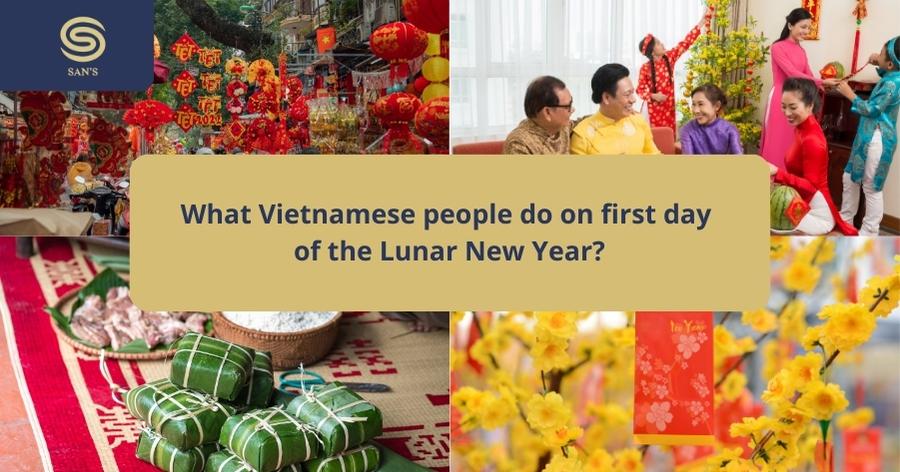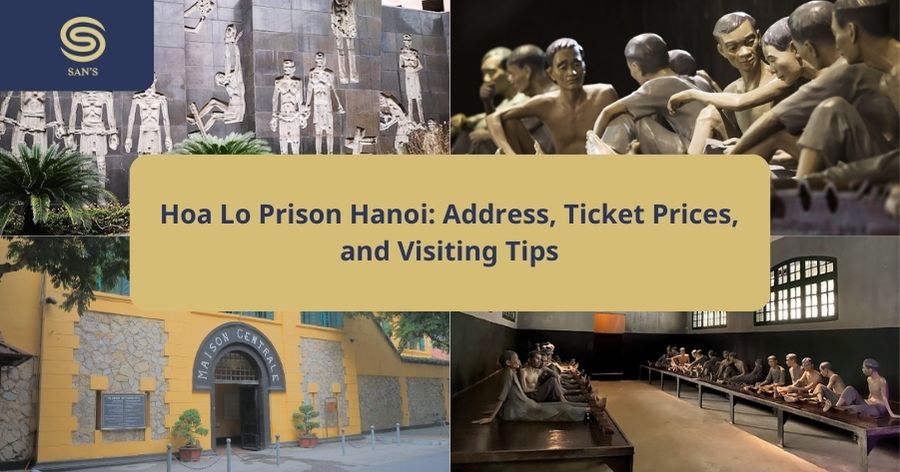On first day of the Lunar New Year Vietnamese people refer to it as the first day of Tet. From early morning, families gather to pay respect to their ancestors, exchange sincere wishes and celebrate with festive parties. So what do Vietnamese people usually do and avoid on these days? Let’s find out with Sanhotelseries!
The significance of the first three days of lunar new year in Vietnamese tradition
The first three days of the Lunar New Year hold special cultural and familial significance in Vietnam. Each day is marked by unique customs and traditions that strengthen bonds and honor relationships.
On first day of the lunar new year Vietnamese: Honoring fathers
The first day of the Lunar New Year, known as “Mồng Một Tết Cha”, is the most important day of the entire celebration. Early in the morning, families come together to prepare offerings for the New Year, enjoy festive meals, and exchange warm wishes within the family circle.
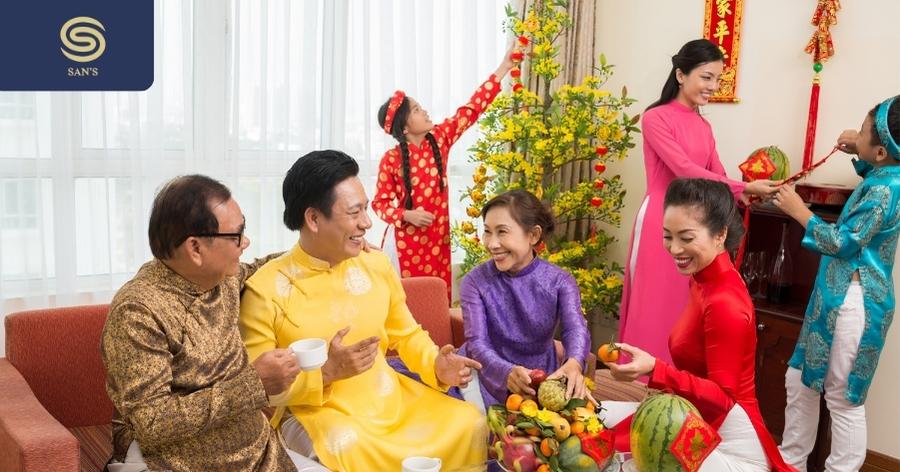
Traditionally, people avoided leaving their homes on this day unless they were specially invited to be the first visitor, believed to bring good luck. For those who live separately from their parents, this day is dedicated to visiting and extending New Year greetings to fathers, emphasizing the respect and gratitude deeply rooted in Vietnamese culture.
The second day of Lunar January: Celebrating mothers
The second day, known as “Mồng Hai Tết Mẹ”, begins with ancestral offerings at home. Afterward, families visit their mothers to express love and appreciation. For men preparing for marriage, this day also includes a visit to the future in-laws’ house, a tradition called “Đi sêu”, where they offer New Year wishes and gifts, symbolizing goodwill and respect.
The third day of Lunar January: Respecting teachers
The third day, “Mồng Ba Tết Thầy”, is dedicated to honoring teachers. After completing the final New Year offerings at home, students visit their teachers to express gratitude and wish them success in the year ahead. This tradition highlights the Vietnamese value of education and the deep respect for those who impart knowledge.
During these three days, families and friends also take time to visit each other, return to their hometowns, and share stories about the past year while discussing hopes and plans for the future. These meaningful customs make the Lunar New Year a time of unity, reflection, and celebration.
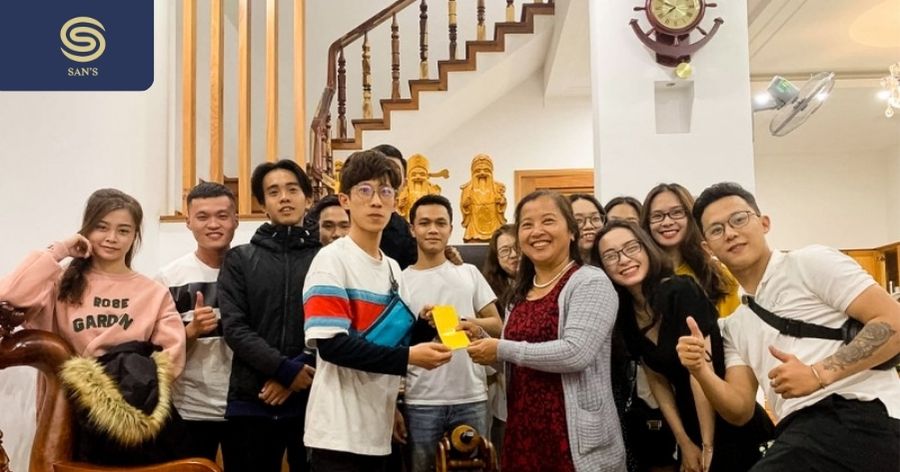
What to do on Lunar New Year’s day for a year of luck and prosperity
Lunar New Year is a time of renewal and hope, and the traditions we follow on the very first day set the tone for the year ahead. So, what are the essential things you should do on New Year’s Day to invite wealth, luck, and abundance into your life?
Honoring ancestors with Incense rituals
In Vietnamese culture, ancestor worship is a deeply rooted tradition that reflects gratitude and reverence for family heritage. On the first day of the Lunar New Year, one of the most important acts is lighting incense to honor ancestors. Families prepare elaborate offerings, carefully arranging warm and hearty dishes as a gesture of respect and prayer for a year filled with happiness and peace.
When lighting incense, it is customary to use an odd number of sticks, as odd numbers are traditionally associated with good fortune and positivity. Even numbers, on the other hand, are often avoided as they are believed to bring less favorable energy. This simple act carries profound meaning, bridging the past and present while setting a hopeful foundation for the year ahead.
Temple visits to start the year
For generations, visiting temples during the New Year has been a cherished tradition in Vietnam. It is believed that paying respects to Buddha and praying for the well-being of loved ones can bring harmony, warmth, and blessings for the year ahead. On the morning of Lunar New Year’s Day, many people choose to visit temples not only to seek spiritual peace but also to enjoy the serene beauty of the temple grounds, offering a moment of relaxation after a busy year.
Lucky red envelopes (Lì Xì)
A beloved New Year tradition is giving and receiving red envelopes filled with money, known as “lì xì.” Adults present these envelopes to children and younger family members along with heartfelt wishes for health, success, and happiness. In return, children often wish their elders good health and longevity.
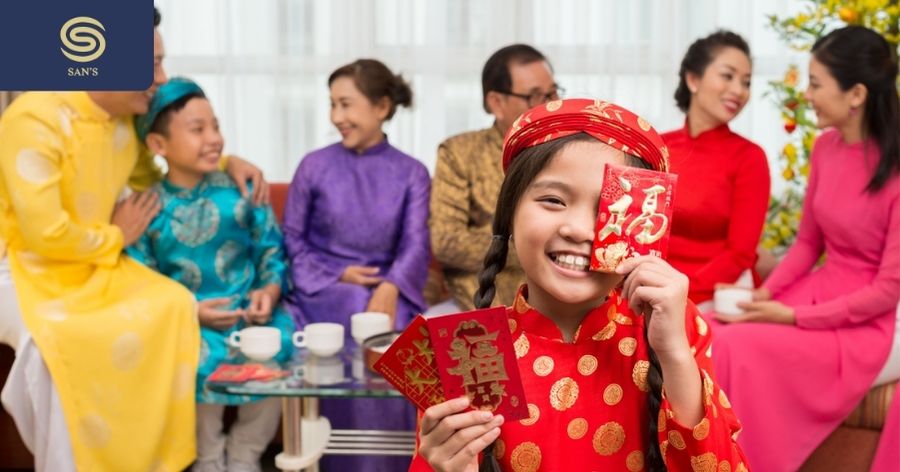
These vibrant red envelopes symbolize prosperity and joy, making them an essential part of New Year celebrations. Friends also exchange these envelopes as a gesture of goodwill and mutual encouragement for a successful year.
Buying Salt for good luck
An age-old custom in Vietnam is purchasing salt on the morning of the first day of the year. This simple act symbolizes the hope for a harmonious and enduring family bond, as salt represents purity, preservation, and connection in Vietnamese culture.
Wearing red for positivity
In Vietnamese tradition, red is considered the color of luck, joy, and abundance. On New Year’s Day, wearing red clothing is believed to attract happiness and prosperity. Beyond attire, homes are adorned with red decorations, such as couplets and ornaments, to invite peace and good fortune into the household.
Eating symbolic foods
Traditional New Year dishes hold special significance in Vietnamese culture. Bánh chưng, a square-shaped sticky rice cake, is a must-have during the Lunar New Year. Representing the earth, it symbolizes gratitude for the land that sustains us. Other lucky dishes include bánh tét, bánh dày, and xôi gấc, each carrying its own wishes for prosperity and harmony.
New year taboos to avoid for a prosperous year
Lunar New Year is a time of joy and hope, but it is also steeped in traditions and beliefs about what should be avoided to ensure good fortune. Here are some taboos to keep in mind on the first day of the year to invite luck and prosperity into your life.
Avoid sweeping the floor, taking out the trash
Sweeping the floor or discarding trash on New Year’s Day is believed to sweep away wealth and prosperity. To keep good fortune intact, households refrain from these activities and instead focus on celebrating the arrival of a new beginning.
Refrain from giving away fire or water
Fire represents warmth, luck, and happiness, while water symbolizes wealth and abundance. Sharing these elements with others at the start of the year is seen as giving away your own fortune and stability. To preserve these blessings, families avoid lending fire or water on the first day.
Say no to borrowing or repaying debts
Financial transactions, including borrowing or repaying money, are considered inauspicious on New Year’s Day. Engaging in such activities is thought to invite financial difficulties and instability throughout the year, so it is best to steer clear of them.
Avoid arguments and profanity
New Year’s Day is a time for harmony and positivity. To maintain this cheerful atmosphere, people avoid quarrels, harsh words, and inappropriate language, as they are believed to bring bad luck and discord for the entire year.
Be careful not to break anything
Breaking items such as dishes, cups, or mirrors is associated with separation and misfortune. To protect familial bonds and ensure a peaceful year ahead, extra care is taken to prevent accidents that might lead to breakage.
Do not use needles or scissors
Sewing and using sharp objects are considered unlucky on the first day of the year. It is believed these activities can bring hardship and difficulty. Some even hold the superstition that if a pregnant woman uses a needle on this day, her child may be affected in unusual ways.
Keep your doors open
On New Year’s Day, it is vital to welcome luck and positive energy into your home. Closing the doors is believed to block good fortune and prosperity from entering. By leaving your doors open, you create an inviting space for blessings and opportunities in the year ahead.
What do Vietnamese people usually do during Tết?
Tết, or the Vietnamese Lunar New Year, is the most significant holiday in Vietnam, celebrated with vibrant traditions and meaningful activities that showcase the nation’s rich culture. From bustling markets to family reunions, every moment of Tết is filled with joy and anticipation for a prosperous year ahead. Here’s an in-depth look at what Vietnamese people typically do during this festive season.
Shopping at Tết markets
In the weeks leading up to Tết, traditional markets come alive with colors, sounds, and scents. Known as “chợ Tết,” these markets are where families shop for essential items, including fresh fruits, flowers, decorations, and ingredients for special dishes. Popular purchases include kumquat trees, peach blossoms, and red envelopes for giving lucky money. The lively atmosphere of these markets captures the spirit of excitement and preparation that defines the holiday season.
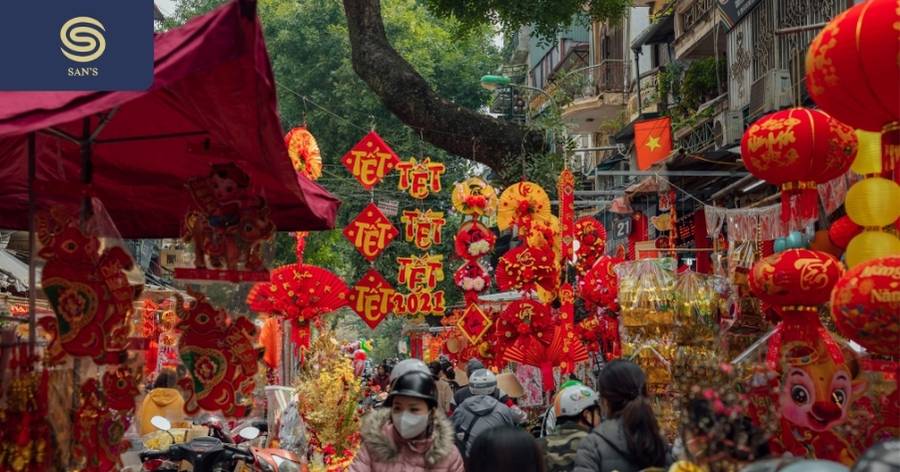
Decorating homes
As Tết approaches, Vietnamese families clean and decorate their homes to welcome good luck and prosperity. Cleaning symbolizes sweeping away the past year’s misfortunes, while decorations like red banners, calligraphy, and traditional ornaments invite blessings for the new year. Flower displays, such as peach blossoms in the north and apricot blossoms in the south, hold special significance, representing renewal and vitality.
Making bánh chưng
A quintessential Tết tradition is the making of bánh chưng (square sticky rice cake) and bánh tét (cylindrical sticky rice cake). These cakes are made with glutinous rice, mung beans, and pork, wrapped in green leaves to symbolize the earth and gratitude for nature’s bounty. Families often gather to prepare these cakes, turning the process into a cherished bonding activity. Cooking bánh chưng in a large pot over a fire creates a festive atmosphere and strengthens family connections.
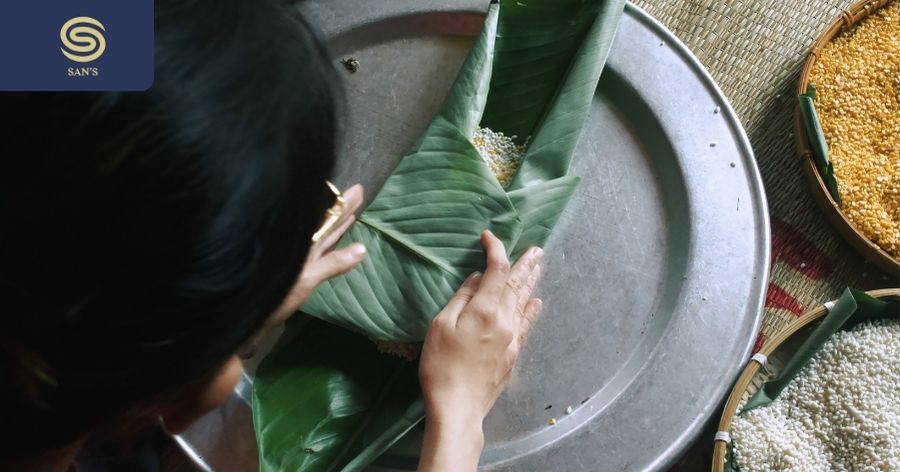
=>See more: Celebrating Lunar New Year 2025: Traditions, Customs, and Joy in Vietnam
Participating in festivals and traditional games
Tết is also a time for cultural festivities and traditional games. Villages and towns host vibrant festivals featuring lion dances, calligraphy demonstrations, and performances of folk music. Popular games like “đánh đu” (bamboo swing) and “đấu vật” (wrestling) bring communities together in the spirit of fun and unity. These events celebrate Vietnamese heritage while providing opportunities for people to relax and enjoy the holiday.
Paying respects to ancestors and visiting temples
A significant aspect of Tết is honoring ancestors and seeking blessings for the new year. Families set up altars with offerings of fruits, flowers, and food to express gratitude to their forebears. Visiting temples is another common activity, where people pray for health, happiness, and success. These rituals highlight the deep spiritual roots of Vietnamese culture.
Reuniting with family and sharing lucky money
Tết is a time for family reunions. Relatives come together to share meals, exchange stories, and enjoy each other’s company. An essential tradition during Tết is giving “lì xì” (red envelopes containing money) to children and elders. This gesture symbolizes blessings of good fortune and happiness for the year ahead.
Enjoying traditional foods
Beyond bánh chưng and bánh tét, Tết is a culinary celebration. Families prepare and enjoy traditional dishes like pickled vegetables, boiled chicken, sticky rice, and candied fruits. These foods carry symbolic meanings, such as unity, prosperity, and longevity, making them an integral part of the holiday.
Spreading joy and well-wishes
Throughout Tết, people visit friends and neighbors to exchange good wishes for the new year. Common greetings include “Chúc mừng năm mới” (Happy New Year) and “An khang thịnh vượng” (Health and Prosperity). This tradition reinforces community bonds and spreads joy among loved ones.
Traditional new year greetings in Vietnam
The Vietnamese Lunar New Year, or Tết, is a time of joy, reunion, and heartfelt wishes for a prosperous year ahead. On the first day of Tết, it is customary to greet friends and family with “Chúc mừng năm mới”, meaning “Happy New Year”. Along with this, a variety of well-wishes are exchanged, tailored to express hopes for health, happiness, and success.
Common new year greetings:
- Chúc mừng năm mới: Happy New Year
- Sức khỏe dồi dào: May you enjoy abundant health
- An khang thịnh vượng: May you have peace, robust health, and prosperity
- Phát tài phát lộc: Wishing you prosperity and wealth
- Tiền vô như nước: May money flow in like water
- Sống lâu trăm tuổi: Wishing you a long life of 100 years
- Hay ăn chóng lớn: Wishing you to eat well and grow quickly
- Năm mới, thắng lợi mới: Wishing you new success in the new year
- Vạn sự như ý: May all your wishes come true
Special wishes for children and elders: For children, “Hay ăn chóng lớn” conveys hopes for growth and health, encouraging them to eat well and grow strong. For elders, “Sống lâu trăm tuổi” reflects respect and care, wishing them a long and fulfilling life.
>> Read more: Hanoi temperature december: Is December a good time to visit Hanoi?
Here is the “What Vietnamese people do on first day of the Lunar New Year?”. Wishing you a delightful trip to Vietnam! If you’re visiting Vietnam and the capital, Hanoi, you can book a room at San Hotel at the best prices here!
Follow us on Facebook to get the latest travel updates daily: San Hotel Series



